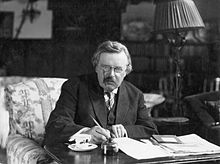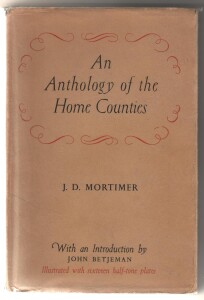With commentaries by Dorothy Saunders. 
Anthologies are not rare publications; they have appeared regularly for two hundred years or more. However an anthology of prose and poetry accompanied by commentaries on the material anthologised is pretty unusual in English. The well read Dorothy Saunders first brought out The Moon is Up, an anthology on the subject of old age, as a private publication for her friends and family in 1954. A year later a commercial publisher, Phoenix House, were impressed enough to take it on themselves, and a copy of this book is what we found among the piles of volumes at Jot HQ the other day.
One supposes that the publisher saw in this book something unusual—commentaries that outnumbered in words the actual passages anthologised—and these commentaries, though not particularly intellectually demanding, possess a certain appeal in their commonsensical and occasionally perceptive flavour. Saunders was obviously a philosophical and reflective person—the sort of woman you might turn to for comfort at a moment of personal crisis—a serious illness or injury, perhaps—but her reflections generally lack the wow factor. For instance, responding to passages from Walter de la Mare, Wilfred Scawen Blunt and Gerald Bullett she has this to say:
‘ When we were in love we walked on air, exalted, and that is why we sometimes long to be in love again. With no specific object in mind we desire to live once more in that exquisitely heightened climate of the senses. Young men in battle, I have been told, have known this sharpened view of life…Mere existence gains depth and colour when its tenure is precarious…’
Hardly revelatory! Saunders also seems to be very conventional in her views of work/play.
‘ A man who can truthfully say : My work is my hobby, in an exceedingly lucky fellow , for most people have little choice of the way they earn their daily bread in this machine age, and only a minority have interesting and congenial jobs ‘. Continue reading →



 Even today, thirty six years after his death, John Betjeman can still surprise us with his wisdom and original mind. In 1947, less than two years after the end of a war that brought the prospect of a radiation death to the innocent citizens of Great Britain, destroyed some of finest Georgian terraces in London and Bath, that peppered landmark buildings, including St Paul’s Cathedral and the Dulwich Art Gallery with shrapnel, and pock-marked the pastoral landscapes of Surrey, Middlesex and Essex, the editors at Methuen asked the rising poet of the suburbs to provide an Introduction to their new anthology by someone called J. D. Mortimer ( who he?) on the Home Counties.
Even today, thirty six years after his death, John Betjeman can still surprise us with his wisdom and original mind. In 1947, less than two years after the end of a war that brought the prospect of a radiation death to the innocent citizens of Great Britain, destroyed some of finest Georgian terraces in London and Bath, that peppered landmark buildings, including St Paul’s Cathedral and the Dulwich Art Gallery with shrapnel, and pock-marked the pastoral landscapes of Surrey, Middlesex and Essex, the editors at Methuen asked the rising poet of the suburbs to provide an Introduction to their new anthology by someone called J. D. Mortimer ( who he?) on the Home Counties.